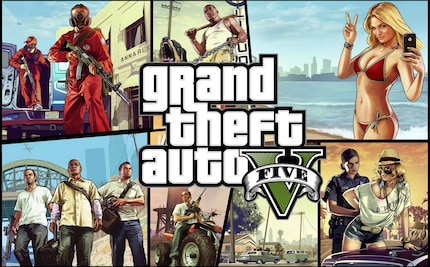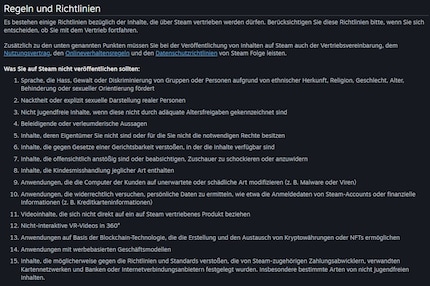
Background information
Valve – the world’s most unconventional billion-dollar company
by Oliver Herren

It’s made quite a buzz. Steam has removed numerous games from its platform, with itch.io following suit. All of it down to financial service providers apparently exerting pressure on both portals.
Without much notice, Steam removed more than 150 games and DLCs from the platform. Shortly thereafter, smaller portal itch.io, where mainly indie studios offer their games, removed thousands of games with the NSFW tag (Not Safe For Work = adult content). The result: an outcry among developers and the gaming community. There’s talk of arbitrary censorship, chaotic communication and opaque rules.
But what’s behind this mass deletion? And who’s really putting pressure on whom? Well, if you’ve only heard about this topic in passing, you’ve come to the right place.
The game No Mercy was released in spring 2025. Your only goal in it is to rape the female characters (article in German). It’s beyond tasteless, and certainly in the dark grey area of what’s allowed on Steam. The game was met with massive controversy and some countries, including Australia and Great Britain, banned the game. The developer then removed it from the platform himself as a preventive measure.
One Australian conservative group, Collective Shout, was involved in the campaign against No Mercy. The group campaigns against the sexualisation of and violence against women and girls. In this context, they also combat pornography, revealing advertising, independent sex work and various sexual fetishes.
In 2014, for example, the group wanted to prevent US rappers Snoop Dog and Eminem from performing in Australia because their lyrics reference violence against women.

The group’s founder, Melinda Tankard Reist, published an opinion piece against the BDSM novel Fifty Shades of Grey in 2017. Her main criticism is that the portrayal of sexualised violence against women is trivialised and romanticised.
Collective Shout has also already worked against video games. In 2014, the group launched a campaign against GTA V, a game that generally isn’t squeamish in its treatment of humans and animals. The associated petition stated that GTA V encourages players to murder women just for entertainment. Although this is completely unfounded, the campaign was successful: an Australian supermarket chain removed the game from its range.

A Twitter campaign against the game Detroit: Become Human followed in 2018. I can’t see the original tweet, but it’s pictured in a report on Kotaku. The visible user reactions underline its authenticity. In Detroit: Become Human, some scenes do include violence against a child and a female domestic robot. However, it’s neither carried out by the player nor glorified in any way – quite the opposite. Here’s the entire sequence:
In the wake of the No Mercy controversy, Collective Shout wrote an open letter to the CEOs of various payment providers on 11 July: «[…] we have since discovered hundreds of other games featuring rape, incest and child sexual abuse on both Steam and Itch.io.»
True, anyone who merely peeks at what games go online on Steam every day knows there’s undoubtedly no shortage of pornographic games, ranging from interactive porn to borderline or clearly transgressive fetish games. Apparently, there’s enough of a customer base for this. Still, they usually remain hidden from the vast majority of gamers. So far, Steam itself has only intervened when games have been reported as abusive.
Collective Shout itself hasn’t published a list of games that it considers to contain problematic content. The group is putting on pressure in another way. They think it’s an outrage that the aforementioned payment providers – including PayPal, Visa and Mastercard – generate profits with unethical and violent games.
According to their own information, the group had already contacted Steam several times before about these games. No response. However, they’ve now found some influence in companies such as Visa and the like. Think about it: gaming platforms process all purchases via these payment service providers. Without them, the platforms can’t operate.
For payment providers, on the other hand, Collective Shout has hit a sore spot. In 2022, a Californian court ruled that Visa can be held jointly responsible if the company facilitates payments on platforms that distribute potentially illegal content. The lawsuit was filed by a woman who appeared as a minor in a non-consensual video on adult platform Pornhub.
This means that payment providers are theoretically obliged to verify all offers on their partner platforms for possible legal violations. Collective Shout’s open letter gave sufficient reason to believe that illegal content may be available on Steam and itch.io.
The easiest way to avoid legal risks is to consistently remove potentially problematic content from the platforms. And that’s exactly what happened here. Steam implemented this via a new guideline for game providers.
If you want to put a game on Steam, you have to adhere to the platform’s content guidelines. For example, your game can’t promote hatred, violence or discrimination. Child abuse «of any kind» is banned too. Sexual content must be labelled accordingly. Well-known people may not be shown naked or performing explicit acts.
Until now, these rules have left enough loopholes for many, many dirty games. Detroit: Become Human is also still available on Steam, despite the alleged child abuse. Steam seemed open to discussion in specific cases.
However, Steam is now evading responsibility with a new guideline that appeared in the rules recently – no public announcement, by the way. Banned content now includes anything that «may violate the rules and standards set forth by Steam’s payment processors and related card networks and banks, or internet network providers. In particular, certain kinds of adult only content.»

This means that on top of dealing with Steam’s guidelines, game providers also have to follow along with payment providers on Steam. This is overly bureaucratic and divorced from reality. Even worse, it gives payment processors the right to co-determine games offered on Steam.
Based on this new rule, Steam was able to remove well over a hundred games from the platform. Steam admits it faced pressure from payment providers.
The addition of «certain kinds of adult only content» is also vague and apparently deliberately open-ended. Depending on the mood in the USA, payment processors could, for example, also declare queer topics as «not suitable for minors». There are economic interests behind this too – companies are reacting to pressure from conservative forces and ending diversity programmes, as you can read here (article in German).
A kiss between two young women – such as in story-driven adventure game Life is Strange» – could become problematic. This can be extended to almost any subject area. The fact is, if third-party providers such as payment services reject content for money reasons, games concerned will automatically violate Steam’s guidelines – and can now be removed as a result.
It’s a bad sign of things to come, treating emotionally gripping games with complex themes such as Life is Strange or Detroit: Become Human as problematic, even threatening to do so. Studios could lose their sources of income without violating any laws. Or, to avoid any potential problems, they could just develop cosy games without any depth.
With its new policy, Steam has sacrificed the creative freedom of developer studios instead of fulfilling its own review obligations. It’s a setback for the portrayal of sensitive topics in games.
itch.io is also cracking down: all games marked as adult content have been removed from the platform across the board. In a statement, the company explained its move: «To ensure that we can continue to operate and provide a marketplace for all developers, we must prioritise our relationship with our payment partners and take immediate steps towards compliance.»
It’s possible that the restrictions will be relaxed again after more detailed checks. We don’t know how potentially thousands of candidates will be examined for violations yet. The portal is currently placing all NSFW games under general suspicion due to a few possible black sheep and numerous developers are losing their sources of income.
So, it seems Collective Shout’s open letter has had a major impact. One we can’t fully foresee yet.
Feels just as comfortable in front of a gaming PC as she does in a hammock in the garden. Likes the Roman Empire, container ships and science fiction books. Focuses mostly on unearthing news stories about IT and smart products.
Interesting facts about products, behind-the-scenes looks at manufacturers and deep-dives on interesting people.
Show all